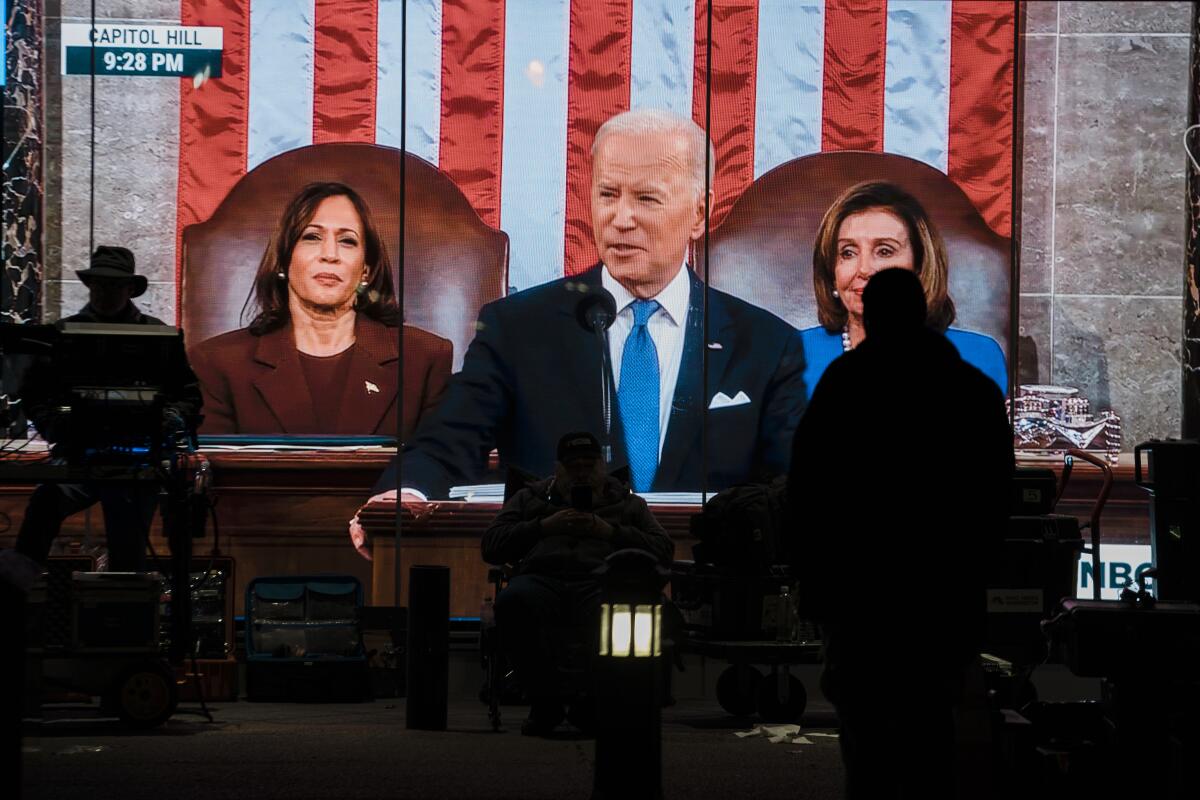Opinion: The State of the Union shouldn’t be self-care for presidents

- Share via
The Constitution, we are reminded at this time of year, mandates that the president of the United States report to Congress on the state of the union “from time to time.”
That said, Article II, Section 3, does not require him to do this in person, late in the evening, for an hour or more, like a dinner guest who keeps on talking while the plates are cleared. Neither is he compelled to bask in the glow of heroes he has placed in the House gallery, or to roam the vast landscape of issues and crises, or to insist, despite appearances, that America’s best days lie ahead.
Yet President Biden, in Tuesday night’s address, will no doubt do all these things — just as he did last year, just as Donald Trump, Barack Obama and others did before him.
The State of the Union address is often described, charitably, as a tradition. What it has become, really, is a nostalgia act — an aging rock star who can’t hit the high notes. The speech is played out, exhausted. It needs a reboot.
The most common grievance against the State of the Union is that it’s painfully, relentlessly long. As a speechwriter for President Clinton, I said the same thing myself, while making the address even longer.
To a surprising degree, Americans tune in regardless: According to Nielsen, more than 38 million people watched Biden’s 2022 address. Not a bad showing for any president.
But the way we watch the speech has changed. This event used to be the only hour all year when a president could count on our undivided attention. Now, for many of us, the speech runs in the background while our eyes are fixed on our phones, scanning social media to see what people are saying about it. The president’s words are fact-checked, mocked, cheered, twisted, debunked — all in real time. It is an intensely mediated experience, like watching a movie while film critics argue loudly in the theater.
While attention spans shrink, presidents continue, administration after administration, to deliver the same speech. Obama, as gifted an orator as the nation has seen in a long time, gave one conventional, shapeless State of the Union address after another. Catchphrases like “Win the future” never caught on. Even Trump — who had delivered an alarming inaugural address (“This American carnage stops right here”) — seemed at pains to give as stultifying a State of the Union as possible. (“Embrace the boundless potential of cooperation, compromise and the common ground,” he urged us, perversely, in 2019.)
The stubborn fact is that presidents like giving this speech this way, no matter what anyone else might think. The State of the Union allows them to reach a national audience in prime time. It gives them running room for victory laps; it drapes their plans in bunting; it makes their banalities sound — if you’re half-listening — almost profound. (“This is our moment to meet and overcome the challenges of our time,” Biden said last year.) The whole experience — including the manufactured applause — is good for the presidential soul, which almost always needs a lift.
There are, of course, less public means of self-care. (People swear by weighted blankets.) The State of the Union should serve a higher purpose, even if it is rarely realized: to paint a vision of the future and set out an agenda that could bring it into being. Pageantry can play a role in that, lending the weight of history to a president’s words. But not if the words themselves are leaden.
Every year, there are calls to abolish the State of the Union, but need we go that far? Why not, instead, simply give a better one? Focused, say, on a single issue? In 20 minutes or less, saving the applause lines for the end?
Why not, for that matter, shake up the show itself? Last year, the House Jan. 6 Committee reinvented the congressional hearing as a suspenseful, tightly scripted, multimedia presentation. In 2020, amid the worst of the pandemic, Democrats made a virtue of necessity and pared down their party’s convention, adding pre-recorded segments. The results were uneven, but few viewers missed the old format.
Change for change’s sake can be a gimmick. But continuity for continuity’s sake can be a dead end, and that is where Biden will be if he tells us, again, that the state of the union is strong.
Jeff Shesol, a former speechwriter for President Clinton, is a partner at West Wing Writers and the author, most recently, of “Mercury Rising: John Glenn, John Kennedy, and the New Battleground of the Cold War.”
More to Read
A cure for the common opinion
Get thought-provoking perspectives with our weekly newsletter.
You may occasionally receive promotional content from the Los Angeles Times.










